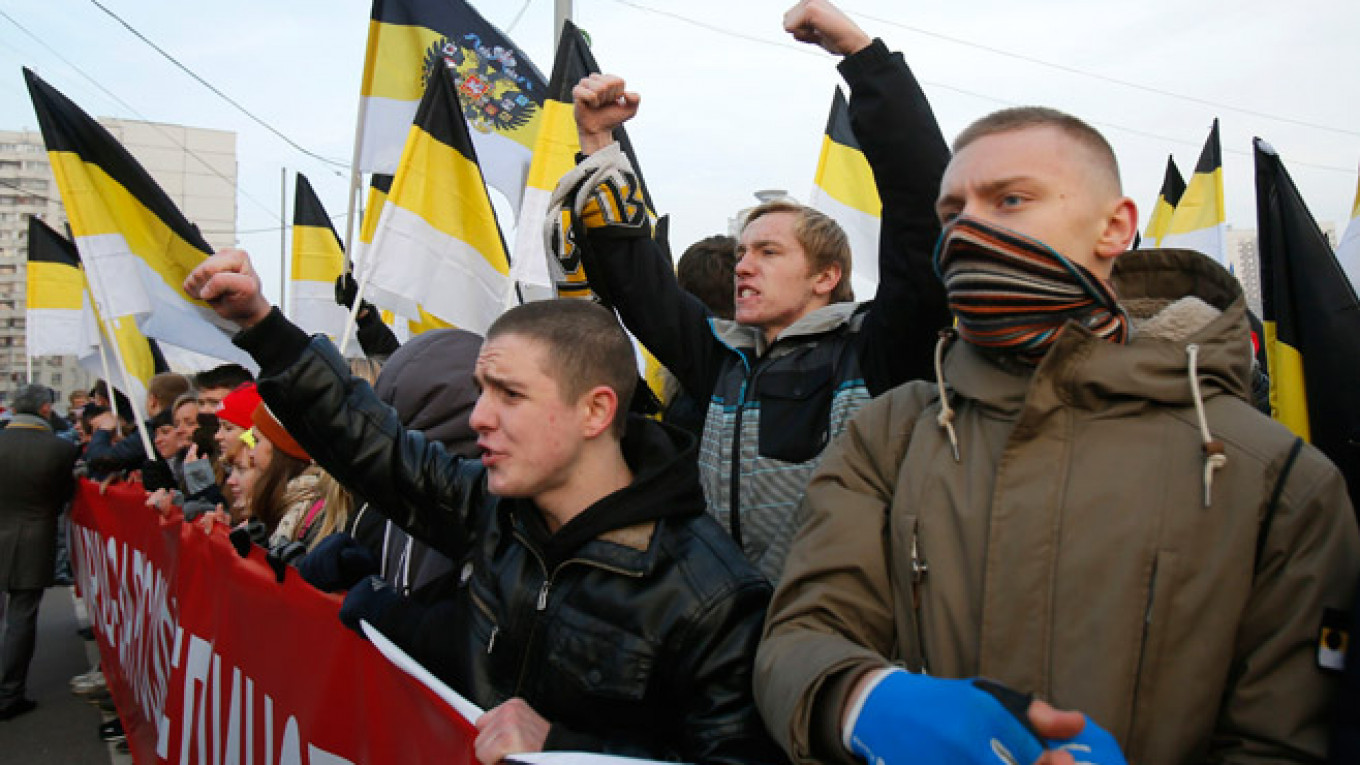Russia marked National Unity Day on Tuesday with a remarkable show of disunity, with three major distinct rallies taking place across Moscow, including the infamous nationalist Russian March.
Nationalism in Russia has long been reviled because of its proponents' penchants for violence and acrid loathing of President Vladimir Putin. But Russia's hawkish policies in Ukraine in recent months have won over many nationalists, turning them into ardent Kremlin supporters.
Those who stuck to the anti-Putin route remain on the fringes. As an indication of public sympathies, the pro-Kremlin "We Are One" rally in central Moscow gathered a crowd of 75,000 on Tuesday, dwarfing the 2,000-strong Russian March, according to police estimates.
Russian March organizers cited figures of up to 10,000, but even they admitted that the crowd in the southeastern Lyublino district was much smaller than in previous iterations of the event, which has been held since 2005.
Local media predicted there might be clashes between the newly pro-Kremlin and anti-Kremlin nationalists, the latter of which see the Ukrainian strife as a "fratricidal war" whose flames have been fanned by Putin.
But nothing of the sort materialized, largely because the nationalist supporters of Ukraine's pro-Russian separatists held their own separate rally in northwestern Moscow, attended by some 1,500.
They were not welcome in Lyublino. "Look what they've done to the country," said rallygoer Yevgeny, voicing what seemed to be a popular sentiment.
"I came out because I can't take it anymore. The country's going to the dogs. We need to do something about it," the 40-something, who sported a red ring dotted with tiny swastikas, told The Moscow Times.
Another attendee, Mikhail, actually claimed to hail from Donbass, the hotbed of insurgency in eastern Ukraine.
Mikhail said he supported the idea of Russia annexing separatist-held regions of Ukraine, but seemed more interested in combatting a worldwide brainwashing conspiracy using iPhone apps that he soon plans to reveal to the world.
Russian March organizer Dmitry Dyomushkin downplayed the divergence in nationalist sentiments for The Moscow Times.
"We've always had divisions. The nationalist movement is not a solid whole," Dyomushkin, who sports a red, forked beard, said on the sidelines of the rally.
Separatist supporters made up a small cohort in Lyublino, which kept its distance from the other columns and fielded low-level verbal abuse from ideological opponents.
But the general mood at this year's installment of the Russian March was amiable, albeit with an edge of xenophobia native to the event.
The column was preceded by pious-looking men, women and children clutching Christian icons and banners, humbly droning hymns throughout the march. One banner depicted '80s pop icon Igor Talkov as Jesus Christ.
The actual columns were led by baby-faced teenagers, many wearing football team insignia, with throats strong enough for three hours of nonstop chanting.
"Russia, forward!" was an especially popular chant during the 1 1/2 hours that the column spent standing in one place waiting for a signal to move.
During the actual march, expletive-laden anti-migrant chants were interspersed with shouts along the lines of "Who are we? Russians!"
A single flare was pitched at riot police, but no actual violence ensued, and even the Uzbek rights champion Bakhrom Khamroev — who attended the rally out of curiosity — was able to circle the columns unobstructed, taking pictures.
Dyomushkin said that about 40 people were detained after the rally, mainly for wearing masks, which is prohibited at public events in Russia, RBC news site reported.
Russian Marches were staged in 33 other cities across the country. All of them wrapped up without much excitement.
Peace also reigned at the pro-separatist rally in northwestern Moscow and the "We Are One" event, which — according to Gazeta.ru — saw rallygoers leave in droves without pausing to listen to leaders of the four parliamentary parties giving speeches on national unity, a lack of enthusiasm that the news website alleged may have been because participants were state employees forced to attend, a charge frequently spouted in connection with pro-Kremlin rallies.
Nationalism remains on the margins of Russian society despite fears to the contrary because Russia's national identity is not threatened and needs no defending, said philosopher and columnist Maxim Goryunov, an expert on modern Russian nationalism.
"Lyublino … is a carnival, not a political arena," he said in e-mailed comments Tuesday. "These are simply kids from poor families affirming their masculinity."
Contact the author at a.eremenko@imedia.ru
A Message from The Moscow Times:
Dear readers,
We are facing unprecedented challenges. Russia's Prosecutor General's Office has designated The Moscow Times as an "undesirable" organization, criminalizing our work and putting our staff at risk of prosecution. This follows our earlier unjust labeling as a "foreign agent."
These actions are direct attempts to silence independent journalism in Russia. The authorities claim our work "discredits the decisions of the Russian leadership." We see things differently: we strive to provide accurate, unbiased reporting on Russia.
We, the journalists of The Moscow Times, refuse to be silenced. But to continue our work, we need your help.
Your support, no matter how small, makes a world of difference. If you can, please support us monthly starting from just $2. It's quick to set up, and every contribution makes a significant impact.
By supporting The Moscow Times, you're defending open, independent journalism in the face of repression. Thank you for standing with us.
Remind me later.


